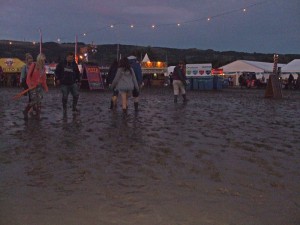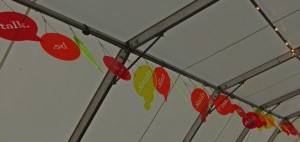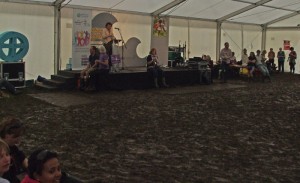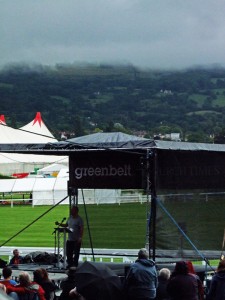 This was my second proper, grown-up trip to Greenbelt. I went once, about thirty years ago, when I was around seventeen. I remember being inspired, excited about ideas of the holy fool, about the possibility of melding radical politics and intellectual enquiry with faith. It was, in retrospect, one of the milestones on my path away from the rather simplistic, if kind and compassionate, evangelical church into which I had just, or was about to, be baptised. But my memories, beyond that, are hazy in the extreme. The idea of going there again last year was inspired neither by faith or politics, but by my failure to get tickets for the Cambridge Folk Festival. I’d seen Show of Hands at Glastonbury, and had such a good time bouncing up and down and shouting ‘Arrogance, Ignorance and Greed!’ that I was keen to repeat the experience. Lots of others obviously had the same idea, and by the time I got to a computer, the big days at Cambridge were all sold out. I then noticed that they were playing at Greenbelt, along with Billy Bragg and Grace Petrie, two more of my Glastonbury highlights.
This was my second proper, grown-up trip to Greenbelt. I went once, about thirty years ago, when I was around seventeen. I remember being inspired, excited about ideas of the holy fool, about the possibility of melding radical politics and intellectual enquiry with faith. It was, in retrospect, one of the milestones on my path away from the rather simplistic, if kind and compassionate, evangelical church into which I had just, or was about to, be baptised. But my memories, beyond that, are hazy in the extreme. The idea of going there again last year was inspired neither by faith or politics, but by my failure to get tickets for the Cambridge Folk Festival. I’d seen Show of Hands at Glastonbury, and had such a good time bouncing up and down and shouting ‘Arrogance, Ignorance and Greed!’ that I was keen to repeat the experience. Lots of others obviously had the same idea, and by the time I got to a computer, the big days at Cambridge were all sold out. I then noticed that they were playing at Greenbelt, along with Billy Bragg and Grace Petrie, two more of my Glastonbury highlights.
Since being received into the Catholic church at university, I’d grown rather out of touch with developments in the Protestant tradition. In the past couple of years, though, through reading Gladys Ganiel’s Church Without Walls blog, I’d started to discover a little about the Emerging Church movement. The names of the speakers at Greenbelt, although most were unfamilar, included a few that I knew of from Gladys, including Brian McLaren, Phyllis Tickle and Peter Rollins. There were also ‘secular’ speakers whose work I admired; Richard Wilkinson, the co-author of The Spirit Level, the psychologist Oliver James and Mark Thomas, talking about his walk along the Palestinian wall. So, along with my two younger sons, then fourteen and seventeen, one of their contemporaries and Fiona, who at twenty four floated comfortably between me and the boys (at least, I hope she’s comfortable there, so long as her tent stays upright) I made the trek (bus, ferry, several trains, bus etc.) to Greenbelt 2011.
Despite the speakers and music, I’d expected the festival to be a bit anodyne, well-meanng Cliff Richard, so was surprised and galvanised by the challenging visions of the contributors (the theme for the year was Palestine) and the reassuring number of eccentrics among the audiences. The combination of faith, arts and politics (together with the, compared to other festivals, frankly sybaritic loos) seemed pretty near perfect, and even the fact that alcohol was confined to the campsites and the provocatively named Jesus Arms beer tent (how reassuring it would sound to suffer a fatal heart attack there) proved to be rather more a benefit than a hindrance. Devoted as I am to the fermented grape, and on occasion the grain, the sight of teenagers at Glastonbury entirely incapable of rational thought or accurate movement is not an edifying one, while the sea of abandoned lager cans inspired a visceral depression that clouded the most joyful musical experiences.
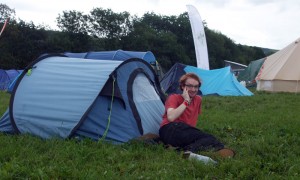 So, as soon as tickets for Greenbelt 2012 went on sale, we booked ours, all of us but our younger friend, whose path of faith was taking him in different directions. There was no Glastonbury this year, and I’d already had more than my lifetime’s share of treats in the trip to South Africa, so this was my first and only festival of the summer. I came, metaphorically speaking, with quite a lot of baggage. (Literally, not, notably without boots of any kind, of which more anon.) In particular I had two areas of confusion and mild dilemma which were sending spirals of unproductive musing around my head and keeping me from getting on with more useful trains of thought.
So, as soon as tickets for Greenbelt 2012 went on sale, we booked ours, all of us but our younger friend, whose path of faith was taking him in different directions. There was no Glastonbury this year, and I’d already had more than my lifetime’s share of treats in the trip to South Africa, so this was my first and only festival of the summer. I came, metaphorically speaking, with quite a lot of baggage. (Literally, not, notably without boots of any kind, of which more anon.) In particular I had two areas of confusion and mild dilemma which were sending spirals of unproductive musing around my head and keeping me from getting on with more useful trains of thought.
As I mentioned above, I was received into the Catholic church at the age of twenty and since then have been fairly regularly, if lazily, observant. Like far more illustrious and devout fellow English converts, including Hopkins and Newman, I found the Irish church something of a shock. During the eight years that I’ve been here, two in the south and six in the north, I’ve met many wonderful Irish Catholics, lots of laypeople and a few priests, and one or two inspiring communities, notably the Franciscan friary in Ennis. Overall, though, my experience of the Catholic church in Ireland has been one of a rather conservative, defensive and self-regarding body, childishly clinging to hierarchical structures, obsessed with sport and academic achievement, generous in charitable giving but unwilling to look at the causes of injustice and poverty, welcoming to incomers but expecting them to conform to narrow cultural and religious norms. The recent furore over Sean Quinn and his family’s financial dealings, during which Fr Brian D’Arcy, whom I like, admire and otherwise generally agree with, spoke at a rally in support of the billionaire, was for me something of a final straw.
If, I asked myself, I feel more isolated than ever from my local Catholic community, increasingly unhappy at the pronouncements of the Vatican, which appears to be attempting some sort of time-travelling excursion back to the 1950s, and downright opposed to Cardinal Keith O’Brien and the like with their crusade against gay marriage, on what basis can I honestly call myself a Catholic at all? The thread that bound me, precious as it was, woven of a sacramental understanding of the relation between earth and heaven, a pretty orthodox theology, the constant, if submerged current of radical social teaching and, most of all, an identification with Christians across the earth and the centuries, was looking perilously thin. Of the specific people I looked to for inspiration within the tradition: Julian of Norwich, Francis of Assisi, Dorothy Day and Oscar Romero, most, though available in spirit, had an unmistakable drawback in dealing with the conundrums of 2012. Except for one.
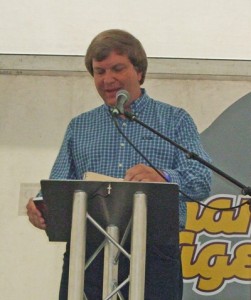 Among the speakers at Greenbelt this year was Fr John Dear, an American Jesuit and peace activist who for a long time has been one of the only living men on my dwindling list of ‘people who are keeping me Catholic’. My emotions, therefore, on seeing his name were a wobbly mixture of joyful anticipation and craven fear. What if he turned out to be less than I’d hoped: to be arrogant, or bigoted, or even self-righteous and humourless? Or, in the other direction, what if he announced that he himself were giving up on the church? I really didn’t want to leave, despite everything. For one thing, I had nowhere else to go. If I wasn’t at all sure that I could be a good Catholic in Northern Ireland, I was pretty positive that I certainly couldn’t be any sort of Protestant here. (I even vaguely fantasised about the Orthodox churches, until the Pussy Riot business showed what a comprehensive leap out of the frying pan that would be.) I have a great deal of time, affection and respect for the Quakers, but I’m not a good enough person to survive as a Friend alone. I need liturgy, sacraments, the community of saints, on earth and heaven, to keep my footsteps even roughly on the right path.
Among the speakers at Greenbelt this year was Fr John Dear, an American Jesuit and peace activist who for a long time has been one of the only living men on my dwindling list of ‘people who are keeping me Catholic’. My emotions, therefore, on seeing his name were a wobbly mixture of joyful anticipation and craven fear. What if he turned out to be less than I’d hoped: to be arrogant, or bigoted, or even self-righteous and humourless? Or, in the other direction, what if he announced that he himself were giving up on the church? I really didn’t want to leave, despite everything. For one thing, I had nowhere else to go. If I wasn’t at all sure that I could be a good Catholic in Northern Ireland, I was pretty positive that I certainly couldn’t be any sort of Protestant here. (I even vaguely fantasised about the Orthodox churches, until the Pussy Riot business showed what a comprehensive leap out of the frying pan that would be.) I have a great deal of time, affection and respect for the Quakers, but I’m not a good enough person to survive as a Friend alone. I need liturgy, sacraments, the community of saints, on earth and heaven, to keep my footsteps even roughly on the right path.
My other dilemma, coincidentally, was another in which I looked to John Dear. It was one which I’d come to the fringes of in real life, and which I was exploring in the novel, Fracking Up, which I’ve nearly finished writing. Simply put, I suppose, it was about the relation between direct action and non-violence. Fr John, whose whole ministry has been guided by principles of non-violence, has been to prison several times for acts of civil disobedience in relation to nuclear weapons. How could he be sure of what actions would be truly peaceful? Was it cowardly of me, in my own small involvement, to eschew direct action in favour of writing and speaking?
I’m not sure exactly what I mean these days about prayers being answered, but whatever it is, I was given it in glorious abundance. John Dear spoke twice over the weekend, and on both occasions I was able to talk briefly to him afterwards. It was all right. He was honest, and humble, and funny and genuine, and he answered my questions with a piercing, lateral clarity, not so much responding to them directly as illuminating for me what had become smeared by too much examination. The Catholic church, I realised, was where I was; there was no point in uprooting myself to try a transplant to some other, equally imperfect soil. ‘Look at Jesus,’ he urged, ‘Read the Gospels. Don’t worry.’
Yes, I saw, the Catholic church is all those things I identified; childish, trivial, blinkered and proud. So am I. It’s also, as the wonderful London Catholic Worker mass on Sunday afternoon demonstrated, joyful, compassionate and challenging. Fr Martin Newell, like Brian D’Arcy a Passionist priest, spoke with incredible honesty and humility about his own life – like John Dear he has been to prison for ‘beating swords into ploughshares’ – and left me in no doubt that it is the log in my own eye, the selfishness of my own life and my own complicity in the systems of war and injustice, which ought to be my first concern.
And yes, Fr John answered my second question too, by his repeated use of the phrase ‘meticulous non-violence’. For an action to be peaceful, I saw, it is not enough for there just to be no intention of using or provoking violence. It must be prepared and prayed over, often for years, to ensure that the freedom and integrity of everyone involved are respected and cared for. ‘Love your enemies,’ said Jesus, not, ‘Don’t have any enemies’ or ‘Your enemies are wrong; therefore they have forfeited their rights’. The people called to do these things are extraordinary; their faith and commitment and discipline – real, contemplative prayer is the basis of their lives – have made them so. To try to bypass all that in search of a quick headline would be arrogant in the extreme. As Fr John pointed out, neither ‘impact’ nor ‘success’ are Gospel words.
Other things happened, too, quite a lot of them bits of weather; rain, high winds and thunderstorms. I don’t know how many appreciated that one of the sub-themes of this year’s festival (the title was Saving Paradise) was climate change. Inevitably, I suppose, after expecting a jejune happy-clappy crowd in 2011, I went to the other extreme this year, and anticipated that everyone would be a radical peace/eco activist, arriving by bike or train with a knapsack of simple necessities. Instead, of course, as the mud deepened, out of the people carriers came the Hunter wellies, the individual toilet tents, the folding chairs and the slightly relentless cheeriness. They’re good people, though, and it’s probably mathematically, as well as sociologically, unreasonable to expect everyone to diverge too far from the norm. If we didn’t want mainstream jollity, it was silly to camp in the middle of the youth groups’ field.
The greatest irritation of the weekend wasn’t the punters, anyway, (I fortunately didn’t hear the woman who, rebuking her daughter for playing in the mud, chided her ‘You don’t want to look like a gypsy, do you?’) but a couple of the supposedly progressive speakers. I came in late to a debate about campaigning held in the Christian Aid tent between Douglas Alexander the Labour MP, Suzanne Matale from the Zambian Council of Churches, and Giles Fraser, the former St Paul’s canon who resigned during the Occupy protest and thereby catapulted himself into a successful media career. The conversation had been largely concerned with the need to move from a charitable to a justice-based outlook (obviously Irish Catholics aren’t the only ones who find the transition difficult). When it came to questions from the audience, which were dealt with in clusters, mine being the second in our group, I suggested that making more specific connections between local and global issues might be a way forward in this regard. As an example, I referred to the proposals to frack for shale gas in Fermanagh and the way in which this, though on a different scale, was analogous to the exploitation of resources by multinational corporations across the majority world. As I finished, another hand immediately went up, and a man, probably ten or fifteen years older than me, asked the final question. Many people there, he pointed out, worked for multinationals, which did a great deal of good. Did the panel agree that it was a cheap jibe to attack them?
Douglas Alexander replied first, and wholeheartedly agreed with the questioner, referring to a recent corporate jobs fair in his constitiuency. Giles Fraser went next, slightly more circumspect, but the gist was that if the corporations paid tax in the right country then they’d be fine. Neither of them addressed my question, or the one that had come before. Finally Suzanne Matale spoke, pausing before she began.
‘I’ve been trying all this time,’ she said, ‘to think of one good thing that the multinationals have done for my country, and I’m finding it very difficult. There are jobs, I suppose, though …’ She went on to point out that neither the wages nor the conditions imposed were exactly generous, and then to deal with my point, with which she agreed. I was slightly distracted by then, though, by the extraordinary series of schoolboy smirks which, as she began to speak, I saw being exchanged behind her back by the two white men. Could I have been mistaken? I’d really like to think so. I don’t expect much from the Labour Party but I had hoped that Fraser’s much-publicised resignation had been underpinned by a bit more respect and humility. I went off for half an hour’s meditation, during which I kept falling asleep, but at least recovered my humour.
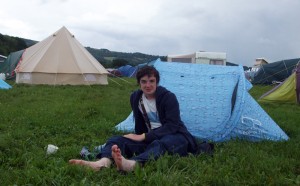 Other than that, and our fruitless struggles to restore Fiona’s collapsed tent on the final stormy night, the weekend was a joy, interspersed, in usual festival fashion, with moments of utter exhaustion. Owing to the complicated nature of my journey (via a family holiday on the Isle of Portland) and space constraints, I hadn’t brought any footwear more substantial than sandals and plimsolls and so had to wade in bare feet through the sea of mud which comprised large portions of the festival. As a result, my carefully concocted schedule was largely abandoned and I missed hearing Suzanne Matale’s own talk as well as Bruce Cockburn’s acoustic set (though he was fantastic on the Mainstage).
Other than that, and our fruitless struggles to restore Fiona’s collapsed tent on the final stormy night, the weekend was a joy, interspersed, in usual festival fashion, with moments of utter exhaustion. Owing to the complicated nature of my journey (via a family holiday on the Isle of Portland) and space constraints, I hadn’t brought any footwear more substantial than sandals and plimsolls and so had to wade in bare feet through the sea of mud which comprised large portions of the festival. As a result, my carefully concocted schedule was largely abandoned and I missed hearing Suzanne Matale’s own talk as well as Bruce Cockburn’s acoustic set (though he was fantastic on the Mainstage).
It was my first Braggless summer since 2008, which was sad, but Grace Petrie played again, more inspiring than ever,
I relived bits of my adolescence with the Proclaimers (‘Letter from America’ is sweetly nostalgic in a world of tweets and Facebook updates), discovered the marvellous Hope & Social, loved the Imagined Village (no Chris Wood, but a couple of Carthys) and danced as wildly as the mud permitted to Bellowhead. I’d seen them at Glastonbury last year in the afternoon, grumpy at having broken my sandal (I mean I was grumpy, not the band) but this late set, with atmospheric lighting and Jon Boden all nineteenth century Gothic in white shirt and black waistcoat, quite Sweeney Todd, was breathtaking.
What else? Quite a lot of Palestine; Zaytoun olive oil and the first showing of Leila Sansour’s Bethlehem film (with Jeremy Hardy looking indecently rugged for a Radio 4 chap), the gloriously silly Folk On, Peter Tatchell, very statesmanlike (in the best sense) and Robin Ince, Greenbelt’s favourite atheist. And I spent what, in retrospect, might seem an odd amount of time listening to gay men talking about Old Testament bodies, thanks to fantastic performances by Peterson Toscano and Pádraig O Tuama. Which last, really, brings me back home, to Northern Ireland, with all its frustrations, opportunities and hard-working, inspirational friends struggling to make a better future. No, the churches aren’t perfect, none of them. How on earth do I think they’d want me if they were?
p.s. Oh dear. That’ll teach me to be ‘downright opposed’ to people. (I hope.) I’ve just, nine days after posting this, read Fr John Dear’s own blog about his tour of Scotland and England, in which he writes:
“Edinburgh’s Cardinal Keith O’Brien is probably the world’s most antinuclear church official. “Nuclear weapons are capable of destroying all life on earth, and their use or threatened use is morally reprehensible,” he says. “Policies of ‘nuclear deterrence’ are a moral failure, and the only viable policy on nuclear weapons has to be one which leads to their complete elimination.” Amazing to hear his clear voice for peace. So different from church officials in the U.S.”
Oops. I still disagree with the Cardinal about marriage for gay people, but he’s clearly not the reactionary I’d envisaged. Mea culpa, in the church’s own wise language.
